ROCK HILL, S.C. — There will be no criminal charges against the David Tepper-owned company or others involved with a Rock Hill roadway expansion intended to handle traffic from the now-failed Carolina Panthers training facility.
"While certainly this is an unfortunate situation, the investigation reveals no criminal intent on the part of anyone involved in the failure of the project and the $21 [million] in tax funds for the Mt. Gallant roadway," S. Creighton Waters, a senior assistant deputy attorney general for the state of South Carolina, said in an Sept. 16 letter to the South Carolina Law Enforcement Division. The letter was obtained by WCNC Charlotte on Tuesady.
After the project ceased construction in 2022, many questions arose. One of those questions was over $21 million in taxpayer money that was being used to expand Mt. Gallant Road. The roadway project was intended to hold the projected volume of future guests to the NFL training site.
"No evidence that any roadway tax money was misappropriated for personal or other improper use," the letter says. ""In the context of a criminal review, the Land Development Agreement contains no overt language definitely requiring segregation of the roadway tax money."
The $800 million facility was expected to become a gem for Rock Hill, drawing new businesses and thousands of visitors each year. Instead, disputes over funding the project led to a bitter battle between Panthers owner David Tepper and officials from both Rock Hill and York County.
Tepper-owned GT Real Estate filed for Chapter 11 bankruptcy in June 2022 and a $100 million settlement was approved six months later. The settlement deal handed the land and the building's incomplete steel shell over to the city of Rock Hill. It’s estimated to be worth $20 million.
Tepper’s real estate company GT Real Estate Holdings will pay York County, which provided sales tax revenue for road improvements, $21 million, and $60 million will be split among the contractors who worked on the project before it was abandoned earlier this year.
All sides agreed to drop their current lawsuits and not file any other claims as part of the deal.
Around the same time the settlement was reached, the state attorney general's office began reviewing the case.
"While certainty there may be viable civil claims for the various parities contractually involved in the failed project, none of those claims arises to the level of criminality," the letter written this month says. "Indeed, it appears that the civil claims have been resolved to the satisfaction of the various parties."
But years later, Rock Hill mayor John Gettys says they can finally see a light at the end of the tunnel.
“So we got the interchange open and now we’re grinding a lot of the concrete and the debris from the microburst back in the spring. That 235 acres gives us that opportunity to stretch ourselves and bring in the kind of jobs we don’t see in Rock Hill today," he told WCNC Charlotte on Wednesday, Sept. 25.
With the interchange complete, Gettys is hoping to attract companies focused on research and development, pharmaceutical companies, and manufacturing companies to hopefully help the city.
"Our unemployment could be lower but more importantly we could have less people in poverty and less people on free and reduced lunch. The way we get out of that bad part is to have jobs in our community – different than what we have now," he said.
Contact Anna King at aking2@wcnc.com and follow her on Facebook, X, and Instagram.


